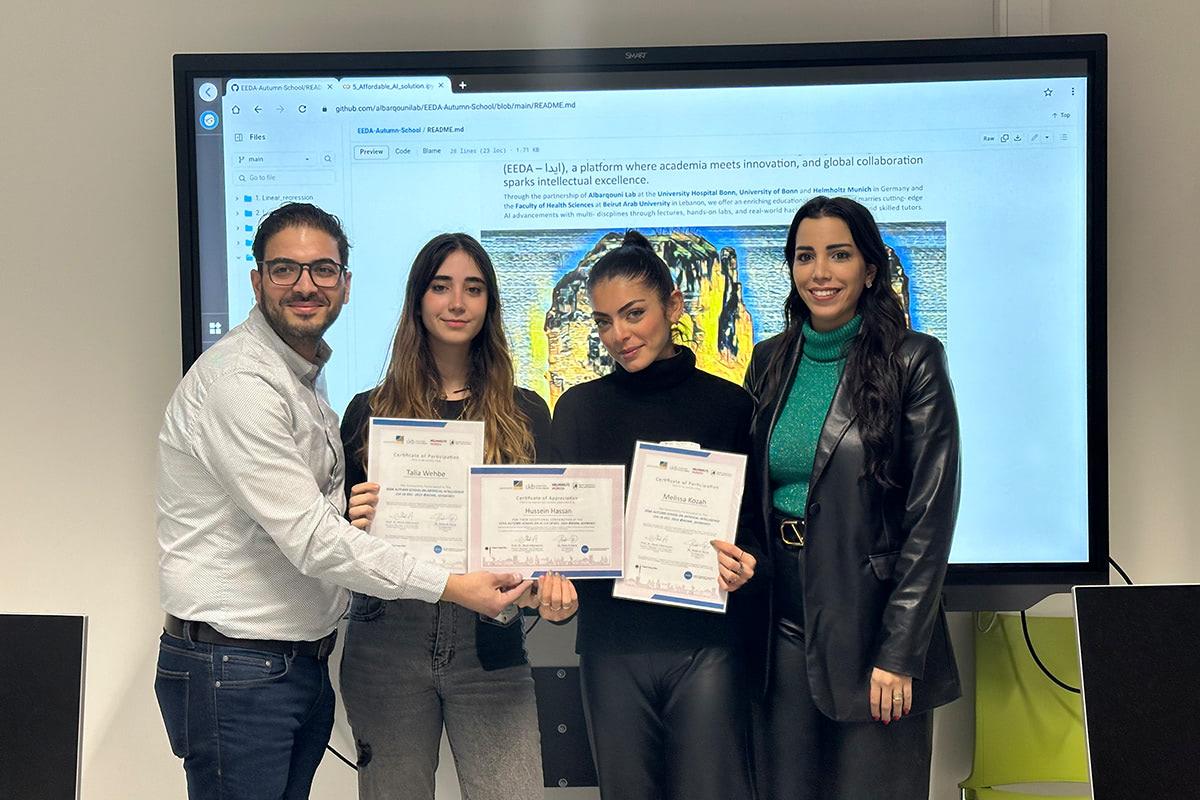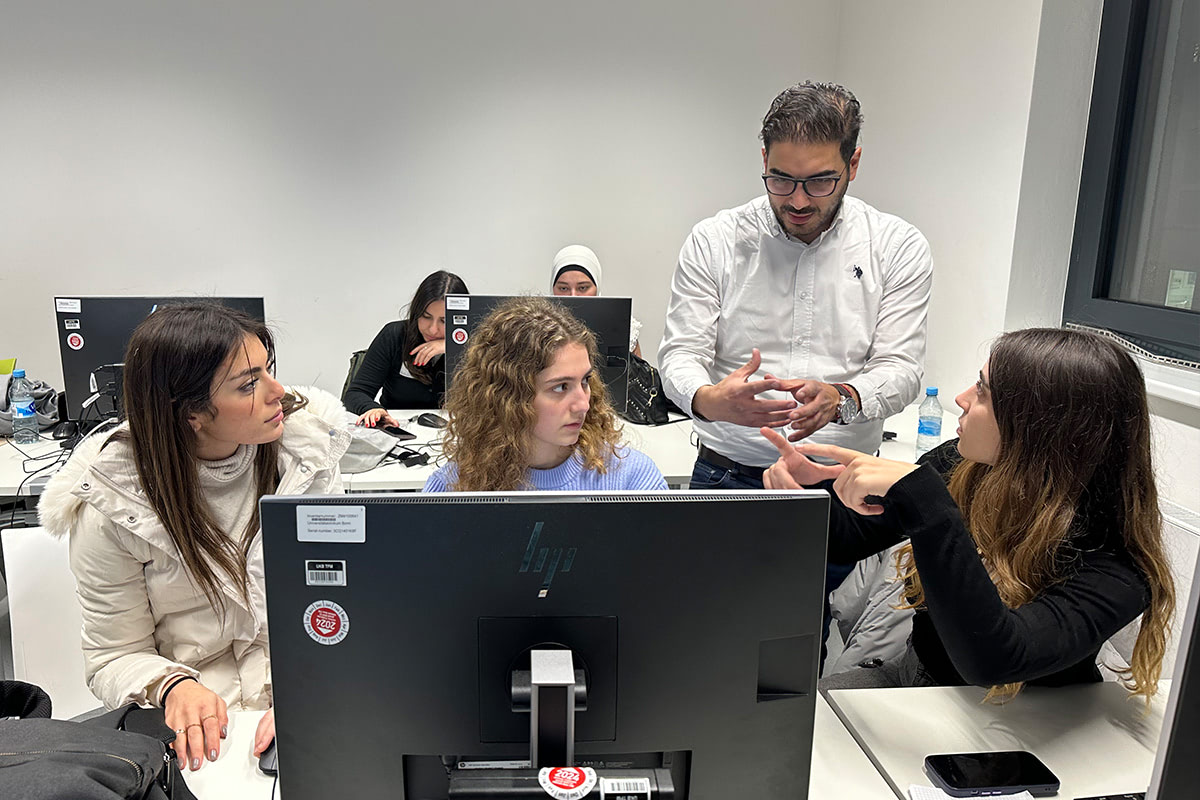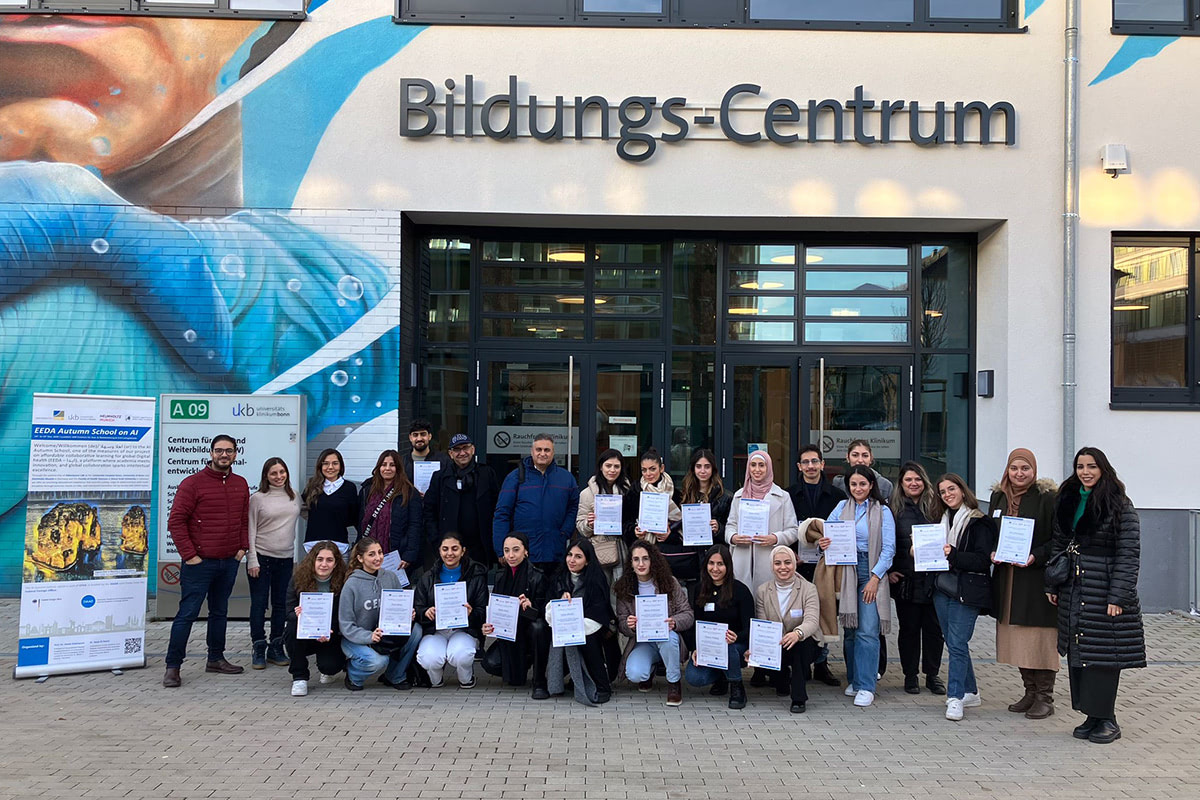LAU Students Explore the Advantages and Limitations of Digital Health
Students from the Department of Natural Sciences gain essential skills and a well-rounded education on the advancements of AI in healthcare.
As artificial intelligence (AI) continues to evolve, it is expanding its reach into nutrition and medicine where it provides cost-effective solutions for streamlining safety inspections and improving diagnostic accuracy.
Recognizing AI’s role in shaping the future of public health, LAU sophomore chemistry student Talya Wehbe and graduate in nutrition Melissa Kozah (BS ‘23) participated in the EEDA AI in Healthcare Autumn School in Bonn, Germany, from December 16-18. In this educational initiative, the teaching modules covered the latest developments in AI, taking into account the specific needs and challenges faced by low-income MENA countries.
“The school wanted individuals who are serious and committed in the health field, so I reached out to my students in the domain,” said Associate Professor Hussein F. Hassan, who specializes in food science and technology. “We should connect with different organizations to introduce the AI culture to our students, especially now that it has become fundamental in today’s job market.”
The autumn school provided an opportunity for students from different academic backgrounds and with varying levels of AI knowledge to acquire essential skills tailored to the demands of the digital age. It was initiated in partnership with Albarqouni Lab at the University Hospital Bonn, University of Bonn, Helmholtz Munich in Germany and the Faculty of Health Sciences at Beirut Arab University, and endorsed by the Arab-German Young Academy of Sciences and Humanities (AGYA).
Through lectures, hands-on labs and hackathons centered on real-world challenges, participants were exposed to the latest AI advancements in food safety, clinical nutrition and medical imaging under the guidance of expert faculty and tutors.
“The AI autumn school offered an excellent and beginner-friendly introduction to the field,” noted Wehbe. “The exercises allowed us to apply and gain a practical understanding of the theories we had learned in the classroom.”
Kozah, who aspires to become a sports and clinical dietician, found that the knowledge and skills she acquired in the program will help her “analyze extensive datasets, tailor nutrition plans based on individual responses, and optimize athletes’ performance by integrating machine learning models with training data.” She also sees the potential in “adopting telehealth solutions and remote monitoring, supported by AI, to reach clients who are unable to attend in-person consultations,” she added.
Discussions on the ethical considerations and challenges of implementing AI in healthcare, such as privacy concerns, data security and potential biases used in low-resource healthcare settings, aimed to impress on the participants the crucial importance of responsible AI practices.
“This emphasis throughout the program further enriched our learning experience and provided us with a solid foundation for implementing AI projects in healthcare,” said Kozah.
Among other collaborative interdisciplinary projects with their peers, Wehbe and Kozah worked on developing inexpensive AI approaches to estimate polyphenols in pomegranates from various regions of Lebanon, and classifying different types of wines based on color, age, taste and other factors. They discovered how machine-learning models can assess product quality, categorize items by characteristics and employ clustering techniques.
“Understanding and acquiring basic skills in AI has become essential for a successful career,” said Wehbe. “The hands-on labs gave us valuable insights into food safety and quality and inspired critical thinking and teamwork. The autumn school was the perfect opportunity to explore the intersection of AI and science,” she added.
“The acquired skills are poised to make a lasting impact on participants’ contributions to digital health and AI advancements,” noted research member at AGYA Nada El Darra and Professor of Computational Medical Imaging Research at the University of Bonn Shadi Albarqouni in a shared statement.
Interim Dean of the School of Arts and Sciences Haidar Harmanani highlighted the added value of such international experiences for students. “These interactions,” he said, “enhance cultural competence for ethical AI use while exposing students to emerging markets and augmenting their readiness for the complex challenges of AI through global career preparation.”
In addition to their academic pursuits, the students got to engage in a cultural experience through social events. From roaming historic landmarks and immersing themselves in the festive vibes of the Christmas Market to delving into German history at the Haus der Geschichte, or House of History, these activities gave them a sense of inclusivity in the global academic community.
Presently, with the launch of the online MS in Applied Artificial Intelligence in fall 2023 and two certificates in AI and Data Science, the university is set on delivering training and expert technical skills in machine learning to prepare its students from various fields for the fast-growing industry.


